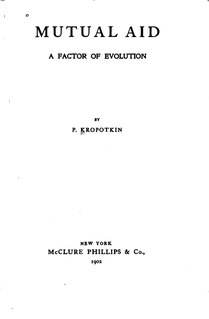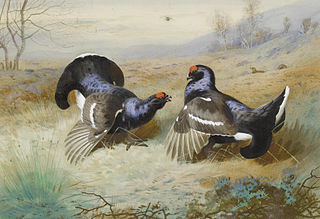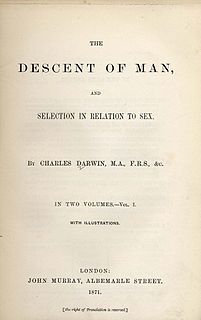Related Research Articles

Altruism is the principle and moral practice of concern for happiness of other human beings or other animals, resulting in a quality of life both material and spiritual. It is a traditional virtue in many cultures and a core aspect of various religious traditions and secular worldviews, though the concept of "others" toward whom concern should be directed can vary among cultures and religions. In an extreme case, altruism may become a synonym of selflessness, which is the opposite of selfishness.

Ethology is the scientific and objective study of animal behaviour, usually with a focus on behaviour under natural conditions, and viewing behaviour as an evolutionarily adaptive trait. Behaviourism as a term also describes the scientific and objective study of animal behaviour, usually referring to measured responses to stimuli or to trained behavioural responses in a laboratory context, without a particular emphasis on evolutionary adaptivity. Throughout history, different naturalists have studied aspects of animal behaviour. Ethology has its scientific roots in the work of Charles Darwin (1809-1882) and of American and German ornithologists of the late 19th and early 20th century, including Charles O. Whitman, Oskar Heinroth (1871-1945), and Wallace Craig. The modern discipline of ethology is generally considered to have begun during the 1930s with the work of Dutch biologist Nikolaas Tinbergen (1907-1988) and of Austrian biologists Konrad Lorenz and Karl von Frisch (1886-1982), the three recipients of the 1973 Nobel Prize in Physiology or Medicine. Ethology combines laboratory and field science, with a strong relation to some other disciplines such as neuroanatomy, ecology, and evolutionary biology. Ethologists typically show interest in a behavioural process rather than in a particular animal group, and often study one type of behaviour, such as aggression, in a number of unrelated species.

Morality is the differentiation of intentions, decisions and actions between those that are distinguished as proper and those that are improper. Morality can be a body of standards or principles derived from a code of conduct from a particular philosophy, religion or culture, or it can derive from a standard that a person believes should be universal. Morality may also be specifically synonymous with "goodness" or "rightness".

Social Darwinism refers to various theories that emerged in Western Europe and North America in the 1870s that applied biological concepts of natural selection and survival of the fittest to sociology, economics, and politics. Social Darwinism posits that the strong see their wealth and power increase while the weak see their wealth and power decrease. Various social Darwinist schools of thought differ on which groups of people are the strong and which are the weak, and also differ on the precise mechanisms that reward strength and punish weakness. Many such views stress competition between individuals in laissez-faire capitalism, while others support authoritarianism, eugenics, racism, imperialism, fascism, Falangism, Nazism, and struggle between national or racial groups.

Mutual Aid: A Factor of Evolution is a 1902 essay collection by Russian naturalist and anarchist philosopher Peter Kropotkin. The essays, initially published in the English periodical The Nineteenth Century between 1890 and 1896, explore the role of mutually-beneficial cooperation and reciprocity in the animal kingdom and human societies both past and present. It is an argument against theories of social Darwinism that emphasize competition and survival of the fittest, and against the romantic depictions by writers such as Jean-Jacques Rousseau, who thought that cooperation was motivated by universal love. Instead Kropotkin argues that mutual aid has pragmatic advantages for the survival of human and animal communities and, along with the conscience, has been promoted through natural selection.

Franciscus Bernardus Maria "Frans" de Waal is a Dutch primatologist and ethologist. He is the Charles Howard Candler Professor of Primate Behavior in the Department of Psychology at Emory University in Atlanta, Georgia, director of the Living Links Center at the Yerkes National Primate Research Center at Emory, and author of numerous books including Chimpanzee Politics (1982) and Our Inner Ape (2005). His research centers on primate social behavior, including conflict resolution, cooperation, inequity aversion, and food-sharing. He is a member of the United States National Academy of Sciences and the Royal Netherlands Academy of Arts and Sciences.

Group selection is a proposed mechanism of evolution in which natural selection acts at the level of the group, instead of at the more conventional level of the individual.
Amorality is an absence of, indifference towards, disregard, or incapacity for morality. Some simply refer to it as a case of not being moral or immoral. Amoral should not be confused with immoral, which refers to an agent doing or thinking something they know or believe to be wrong.

The Descent of Man, and Selection in Relation to Sex is a book by English naturalist Charles Darwin, first published in 1871, which applies evolutionary theory to human evolution, and details his theory of sexual selection, a form of biological adaptation distinct from, yet interconnected with, natural selection. The book discusses many related issues, including evolutionary psychology, evolutionary ethics, differences between human races, differences between sexes, the dominant role of women in mate choice, and the relevance of the evolutionary theory to society.

"Survival of the fittest" is a phrase that originated from Darwinian evolutionary theory as a way of describing the mechanism of natural selection. The biological concept of fitness is defined as reproductive success. In Darwinian terms the phrase is best understood as "Survival of the form that will leave the most copies of itself in successive generations."
Sympathy is the perception, understanding, and reaction to the distress or need of another life form. According to David Hume, this sympathetic concern is driven by a switch in viewpoint from a personal perspective to the perspective of another group or individual who is in need. David Hume explained that this is the case because "the minds of all men are similar in their feelings and operations" and that "the motion of one communicates itself to the rest" so that as affectations readily pass from one to another, they beget corresponding movements.

The social effects of evolutionary thought have been considerable. As the scientific explanation of life's diversity has developed, it has often displaced alternative, sometimes very widely held, explanations. Because the theory of evolution includes an explanation of humanity's origins, it has had a profound impact on human societies. Some have vigorously denied acceptance of the scientific explanation due to its perceived religious implications. This has led to a vigorous conflict between creation and evolution in public education, primarily in the United States.

Evolutionary ethics is a field of inquiry that explores how evolutionary theory might bear on our understanding of ethics or morality. The range of issues investigated by evolutionary ethics is quite broad. Supporters of evolutionary ethics have claimed that it has important implications in the fields of descriptive ethics, normative ethics, and metaethics.
The evolution of morality refers to the emergence of human moral behavior over the course of human evolution. Morality can be defined as a system of ideas about right and wrong conduct. In everyday life, morality is typically associated with human behavior, and not much thought is given to the social conducts of other creatures. The emerging fields of evolutionary biology and in particular evolutionary psychology have argued that, though human social behaviors are complex, the precursors of human morality can be traced to the behaviors of many other social animals. Sociobiological explanations of human behavior are still controversial. The traditional view of social scientists has been that morality is a construct, and is thus culturally relative, although others argue that there is a science of morality.
Empathic concern refers to other-oriented emotions elicited by and congruent with the perceived welfare of someone in need. These other-oriented emotions include feelings of tenderness, sympathy, compassion, soft-heartedness, and the like.
Veneer theory is a term coined by Dutch primatologist Frans de Waal to label the Hobbesian view of human morality that he criticizes throughout his work. Although he criticizes this view in earlier works, the term in this form is introduced in his 2005 book "Our Inner Ape", denoting a concept that he rejects, namely that human morality is "a cultural overlay, a thin veneer hiding an otherwise selfish and brutish nature". The idea of the veneer theory goes back to Thomas Henry Huxley and has more recently been advocated by biologists like George C. Williams.
The history of evolutionary psychology began with Charles Darwin, who said that humans have social instincts that evolved by natural selection. Darwin's work inspired later psychologists such as William James and Sigmund Freud but for most of the 20th century psychologists focused more on behaviorism and proximate explanations for human behavior. E. O. Wilson's landmark 1975 book, Sociobiology, synthesized recent theoretical advances in evolutionary theory to explain social behavior in animals, including humans. Jerome Barkow, Leda Cosmides and John Tooby popularized the term "evolutionary psychology" in their 1992 book The Adapted Mind: Evolutionary Psychology and The Generation of Culture. Like sociobiology before it, evolutionary psychology has been embroiled in controversy, but evolutionary psychologists see their field as gaining increased acceptance overall.

The theoretical foundations of evolutionary psychology are the general and specific scientific theories that explain the ultimate origins of psychological traits in terms of evolution. These theories originated with Charles Darwin's work, including his speculations about the evolutionary origins of social instincts in humans. Modern evolutionary psychology, however, is possible only because of advances in evolutionary theory in the 20th century.

The following outline is provided as an overview of and topical guide to evolution:
Moral emotions are a variety of social emotion that are involved in forming and communicating moral judgments and decisions, and in motivating behavioral responses to one's own and others' moral behavior.
References
- ↑ The Descent of Man, 2d ed. p.122.
- ↑ The Descent of Man, 2d ed. p. 100-104.
- ↑ The Descent of Man, 2d ed. p. 103.
- ↑ The Descent of Man, 2d ed. p. 108.
- ↑ The Descent of Man, 2d ed. p. 106.
- ↑ The Descent of Man, 2d ed. p. 113.
- ↑ The Descent of Man, 2d ed. p.115.
- ↑ The Descent of Man, 2d ed. p. 126.
- ↑ The Descent of Man, 2d ed. p. 109.